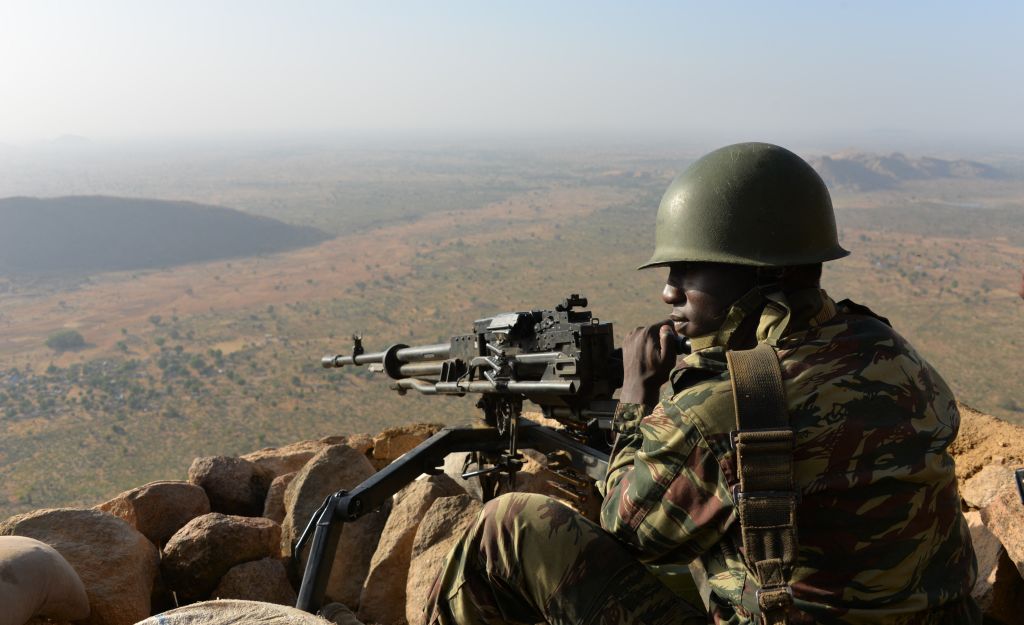Cameroon and Nigeria are working to better secure their shared border following deadly attacks by Boko Haram and its offshoot.
Boko Haram on March 25 killed 12 Cameroonian Soldiers and wounded 10 more in an attack that unfolded between midnight and 3 a.m. at a military base in the border town of Wulgo in northeast Nigeria’s Borno State. Reuters reported that the Boko Haram faction Islamic State West Africa Province (ISWAP) also was involved in the assault.
The Cameroonian Ministry of Defense said the terror groups used “advanced weaponry they increasingly have at their disposal.” The weapons included drones loaded with explosives. Their release triggered a fire that damaged military vehicles and homes in the town.
The attack marked the first time drones with explosives targeted Cameroonian Soldiers amid the country’s battle against Boko Haram and other Islamic State groups. “The attack in Wulgo is a sign of a resurgence in power of these fighters,” journalist Franck Foute wrote for Jeune Afrique.
In response, troops from both countries launched counteroffensive operations through the Multinational Joint Task Force.
Also on March 25, Boko Haram and ISWAP fighters struck an Army base in the Wajiroko area of Borno State. A Soldier in Wajiroko told Reuters that at least four Soldiers were killed and several others injured, including the brigade commander. The attackers also set military patrol vehicles on fire.
Pros, Cons of Reopened Borders
Attacks along the Cameroon-Nigeria border have increased as border posts that closed due to Boko Haram attacks have reopened. On January 27, the governors of Cameroon’s Far North Region and Borno State inaugurated a livestock market in the border town of Banki, once a major hub of cross-border trade about 3 kilometers from Cameroon. Goods from this area typically pass through the Cameroonian towns of Amchidé, Fotokol and Limani en route to the Central African Republic, Chad and Sudan. Reopening the borders allowed the three towns to reestablish trade, create jobs and raise revenue through taxes that local authorities can use for development initiatives, according to the Institute for Security Studies.
“While reopening borders has revitalized the regional economy, it has also benefitted the insurgents — allowing them to regroup and target traders and local communities,” wrote institute researcher Célestin Delanga.
Attacks on traders and transporters on the road, as well as night raids on communities in Cameroon and Nigeria, are now routine. Raiders usually steal contents from trucks, which are then burned. The attackers commonly kidnap or kill the drivers.
According to the institute, there were at least 29 attacks on vehicles transporting goods from Amchidé or Banki between September and November 2024. Terror attacks in Amchidé, Banki, Fotokol and Limani are mainly committed by Boko Haram factions ISWAP, operating around Fotokol, and Jama’atu Ahlis Sunna Lidda’Awati Wal-Jihad, or JAS, based in the Mandara Mountains.
Terror Threats in Southern Cameroon
The terror threat in Cameroon is not confined to the northern border areas with Nigeria. In the first week of January, the Cameroonian military said it lost five Soldiers over two days in terror attacks on the southern border with Nigeria’s Taraba State. Villagers in the Akwaya district said several hundred men crossed into Cameroon over the Moon River.
Aka Martin Tyoga, a lawmaker and member of Cameroon’s National Assembly from Akwaya, blamed Nigerian militant groups that want to seize that part of the country.
“We have asked the people to move away from the border area to the center, where we have the military that has been there since,” Tyoga told Voice of America. “We are pleading that the government should send more forces [military] because these people [armed men] come en masse; they came in 300. Their mode of operating is like Boko Haram. They enter the community and just start killing people, burning down houses.”
Delanga called for Cameroon and Nigeria to reinforce security on the border and bolster intelligence to detect and disrupt terror cells.
“A proactive strategy could prevent the spread of Boko Haram cells along borders and major trade routes, as was the case with past military efforts,” Delanga wrote.
In 2015 and 2016, operations by the Cameroonian Army, supported by Cameroonian and Nigerian troops with the task force, dismantled Boko Haram hideouts and training bases in Borno State.
Delanga said current operations should involve Air Force support and Operation Hadin Kai, led by the Nigerian Army, to destroy Boko Haram cells that target cross-border traders, their vehicles and local communities. Delanga also called for a military escort system to protect trade flows.

